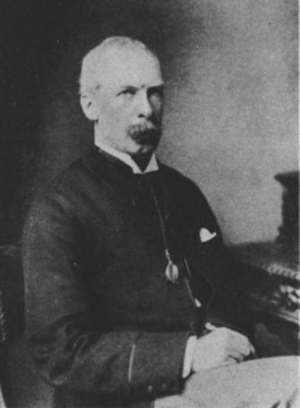Sir Charles Clarke, 3rd Baronet facts for kids
Quick facts for kids
General
Sir Charles Mansfield Clarke
|
|
|---|---|
 |
|
| Governor of Malta | |
| In office 1903–1907 |
|
| Monarch | Edward VII |
| Preceded by | Lord Grenfell |
| Succeeded by | Sir Henry Grant |
| Personal details | |
| Born | 13 December 1839 |
| Died | 22 April 1932 (aged 92) |
| Nationality | British |
| Relations | Sir Charles Mansfield Clarke, 1st Baronet |
| Military service | |
| Allegiance | |
| Branch/service | |
| Years of service | 1856–1907 |
| Rank | General |
| Commands | Governor and Commander-in-Chief of Malta Quartermaster-General to the Forces Madras Army |
| Battles/wars | Basuto Gun War Second Boer War |
| Awards | Knight Grand Cross of the Order of the Bath Knight Grand Cross of the Royal Victorian Order |
Sir Charles Mansfield Clarke (born December 13, 1839 – died April 22, 1932) was a very important British Army officer. He held many high-ranking positions during his long career. He was known for his leadership and service in different parts of the British Empire.
Contents
A Life in the Military
Charles Clarke went to Eton College, a famous school in England. In 1856, when he was 17, he joined the army. He became an officer in the 57th Regiment of Foot. This was the start of his long and successful military career.
Leading Forces in Africa
From 1880 to 1882, Charles Clarke became the top commander of the Colonial Forces in the Cape of Good Hope. This area is now part of South Africa. He helped manage the military forces there.
Important Roles in India
After his time in Africa, he took on several important management jobs. In 1893, he became the Commander-in-Chief of the Madras Army in India. This army was later renamed the "Madras Command of the Indian Army." He was in charge of many soldiers and military operations in that region.
Service in South Africa and Beyond
In December 1899, Charles Clarke was sent to South Africa. He was given command of the Sixth Army Corps during the Second Boer War. This was a major conflict at the time.
From 1899 to 1903, he served as the Quartermaster-General to the Forces. This meant he was responsible for supplying the entire British Army. He made sure soldiers had everything they needed, from food to weapons. On August 5, 1902, he was promoted to the rank of General.
Governor of Malta
After his service as Quartermaster-General, he took on a new role. In 1903, he became the Governor and Commander-in-Chief of Malta. Malta is an island country in the Mediterranean Sea. He was in charge of both the government and the military there. He served in this important position until he retired in 1907.
Becoming a Baronet
On April 25, 1899, Charles Clarke inherited a special title. He became the 3rd Baronet Clarke of Dunham Lodge. A baronet is a hereditary title, like a knight, but it can be passed down through the family.
Family Life
In 1867, Charles Clarke married Gemma Cecilia Adams. They had three sons and three daughters together. Sadly, all of his sons passed away before him. When Sir Charles Clarke died, his nephew, Orme Bigland Clarke, inherited the baronetcy. After Gemma died in 1922, Charles married Constance Marion Warner in 1929.
Awards and Honors
Sir Charles Clarke received several high honors for his service:
- He was made a Knight Grand Cross of the Order of the Bath (GCB). This is a very important award given for outstanding military service. He received this honor in 1900 for his work during the South African Campaign.
- He also became a Knight Grand Cross of the Royal Victorian Order (GCVO) in 1903. This award is given by the monarch for personal service to the Royal Family.
 | Toni Morrison |
 | Barack Obama |
 | Martin Luther King Jr. |
 | Ralph Bunche |

